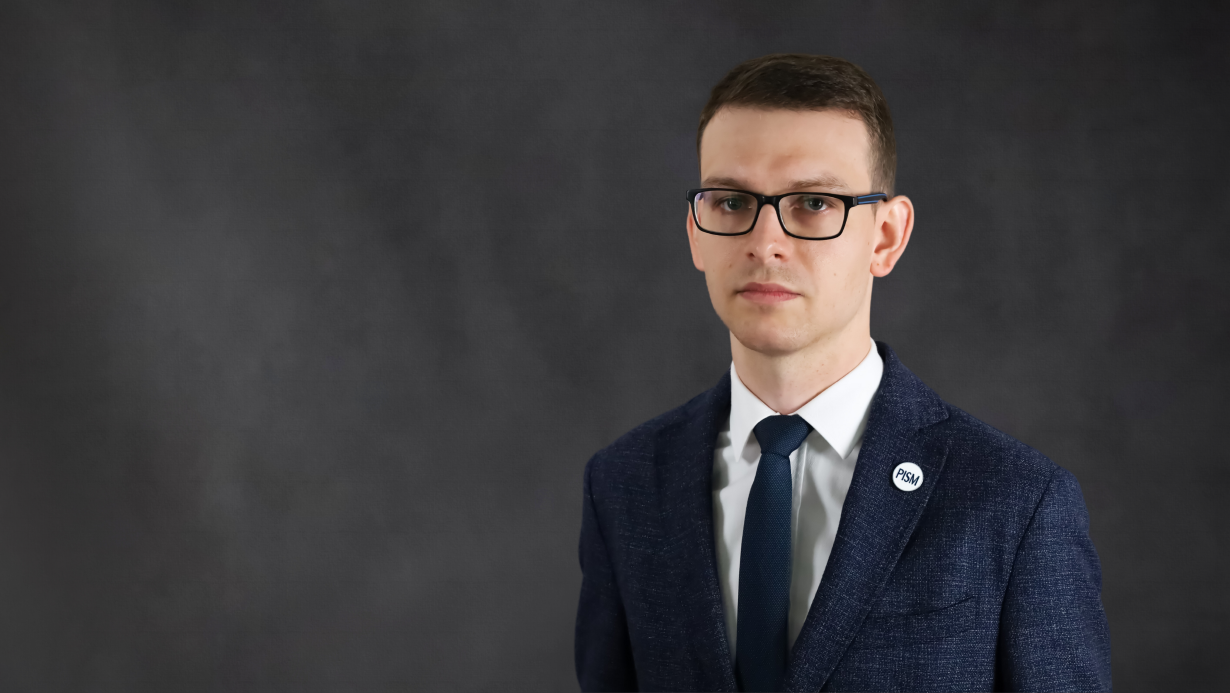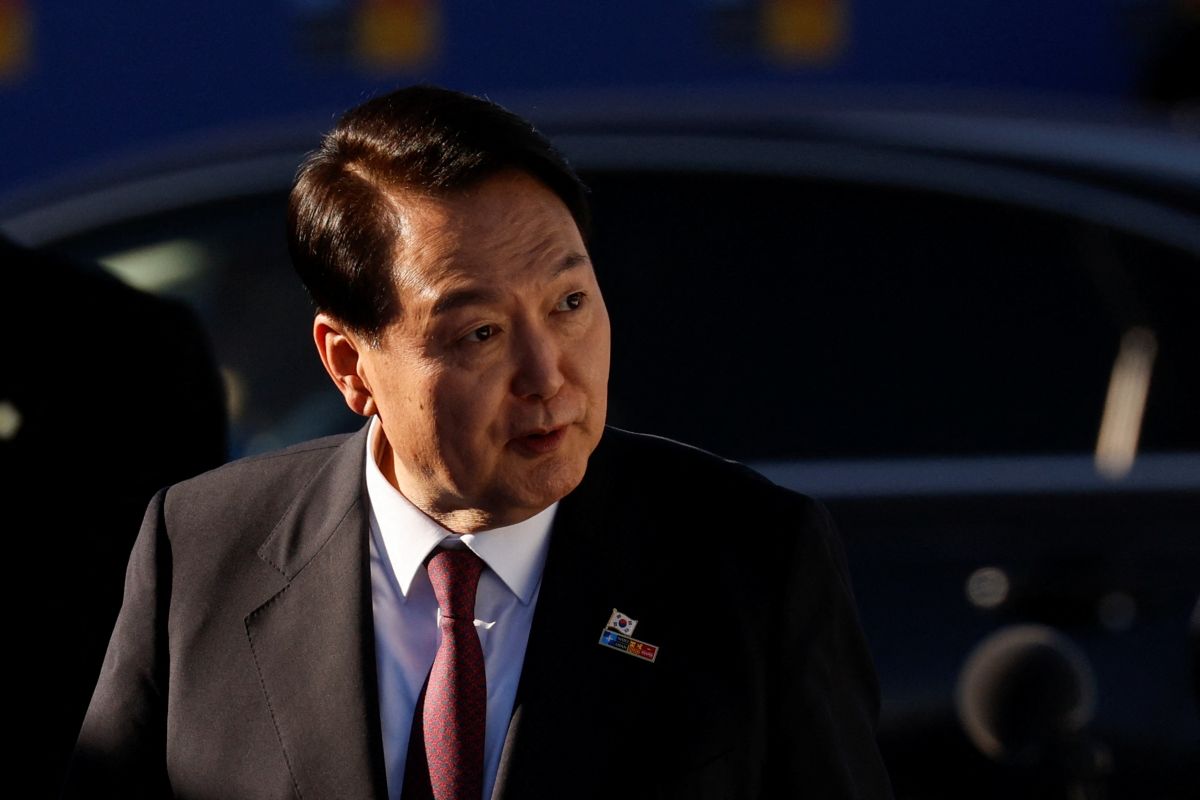Poland-South Korea Strategic Partnership Rises to the Next Level
On 12–14 July, President Yoon Suk-yeol officially visited Poland as the first leader of South Korea in 14 years. The visit occurred on the 10th anniversary of the establishment of the strategic partnership between the countries. It was part of an intensification of bilateral relations in which defence issues and cooperation for the post-war reconstruction of Ukraine are playing an increasingly important role alongside critical economic ties.
.jpg) KUBA STEZYCKI / Reuters / Forum
KUBA STEZYCKI / Reuters / Forum
Yoon Suk-yeol’s visit to Poland was preceded by the NATO summit in Vilnius, which he attended as the leader of one of the Alliance’s four partners from the Asia-Pacific region (Australia, Japan, New Zealand, South Korea; the “AP4”). In Warsaw, Yoon met with, among others, President Andrzej Duda and Prime Minister Mateusz Morawiecki. The talks focused on cooperation on the economy, energy, and defence. The parties signed three intergovernmental agreements on cooperation in trade and investment promotion, transport infrastructure, and the development and reconstruction of Ukraine.
Yoon was accompanied by a large business delegation comprising representatives of 24 conglomerates (chaebols), 41 small and medium-sized enterprises, and 24 business organisations and associations. In addition, the presidents chaired the Korea-Poland Economic Forum, which was attended by more than 260 representatives of Polish firms and 120 South Korean companies. On this occasion, 33 cooperation agreements were signed regarding nuclear, hydrogen and renewable energy, electromobility, and Ukraine reconstruction, among others.
Economic Cooperation and the Reconstruction of Ukraine
Yoon’s visit confirmed the crucial importance of economic cooperation in bilateral relations. In 2022, the value of trade exceeded $10 billion, an increase of 15.4% compared to 2021. Imports from South Korea predominated, translating into a 19.8% year-on-year increase in Poland’s trade deficit to
$8.2 billion. However, this is mainly trade within global value chains; for example, Poland exports batteries for electric cars manufactured in South Korean factories in Lower Silesia to third markets.
South Korea remains the most prominent Asian investor in Poland in terms of cumulative investment value ($4.5 billion in 2021). South Korean companies are particularly active in the sectors of electromobility (manufacturing batteries for electric cars: LG Energy Solution, SK IE Technology, SK Nexilis), electronics (production of household appliances and consumer electronics: LG Display and Electronics, Samsung Electronics), chemicals (production of polypropylene and PET: Hyundai Engineering, SK Chemicals), and R&D (development of software for smartphones and TVs: Samsung Electronics). Polish investments in South Korea are negligible (disinvestments of $33.8 million were recorded in 2021) and are limited to Selena (construction chemicals) and Towimor (shipbuilding industry) activities.
Poland and South Korea are developing cooperation in nuclear power and infrastructure. The potential for cooperation in the construction of a nuclear power plant and developing small nuclear reactors (SMRs) in Poland makes South Korea an attractive partner in the energy transition of the Polish economy. PGE PAK Energia Jądrowa is in talks with Korea Hydro & Nuclear Power about a feasibility study for constructing a nuclear power plant in Konin-Pątnów. Last October, government and business representatives from both countries signed letters of intent to develop plans for Poland’s nuclear power plant. Poland and South Korea have been in talks since 2019 on constructing a Central Communication Port (CPK), with Incheon-Seoul Airport as a strategic advisor. In June this year, the CPK signed a contract with a consortium of Korea National Railway and Dohwa Engineering to design 70 km of high-speed rail between Katowice and Ostrava. Business contacts will also be intensified with the launch of a Wrocław-Seoul direct flight in November this year (in addition to the already operational Warsaw-Seoul route).
The South Korean authorities see Poland as a critical partner in the post-war reconstruction of Ukraine. This subject has been included in agreements signed during the visit and an agreement concluded in May between the Polish Investment and Trade Agency (PAIH) and the Korea Overseas Infrastructure & Urban Development Corporation, a fund that supports South Korean companies in overseas public-private projects. South Korean companies have expressed interest in cooperating with Poland on projects including construction, transport infrastructure, SMRs, and information technology (IT).
Purchase of Armaments and Cooperation of Defence Industries
After the start of the Russian full-scale invasion of Ukraine, Poland expressed interest in purchasing armaments from South Korea and establishing extensive defence cooperation with it. According to last year’s framework agreements, Poland intends to procure 1,000 K2/K2PL tanks, 672 K9/K9PL self-propelled howitzers, 48 FA-50/FA-50PL light combat training aircraft, and 288 K239 Chunmoo rocket launchers. Contracts worth $12.4 billion in net value provide for the purchase and delivery from South Korea of 180 tanks by 2025, 212 howitzers by 2026, 218 rocket launchers by 2027, and all of the aircraft by 2028. The remaining equipment is to be partly manufactured in Poland from 2026 as part of the cooperation agreement between the two countries’ defence industries (the terms are still being negotiated). It is in Poland’s interest that domestic plants not only produce but also service, repair, and modernise South Korean armaments. The most advanced talks concern the tanks and howitzers. The K2 licence provides for production of them not only for Poland’s use but also for export. There are, as yet, no executive agreements specifying, among other things, the details of supply to the Polish army and the division of labour in production, service, and repair. The K239 launchers are already mounted on Polish Jelcz chassis and with the indigenous Topaz integrated fire control system, and in the future, may be manufactured, serviced, and upgraded in Poland together with the missiles used in them. In addition, a service centre for FA-50 aircraft is to be established in Poland in 2026.
For Poland, defence cooperation with South Korea stems from the urgent need to make up for shortcomings following the transfer of armaments to Ukraine and the long-postponed need to replace post-Soviet equipment. It is also part of plans to increase the size of the Polish army and to develop the potential of the domestic defence industry in cooperation with foreign partners. Thanks to the concluded contracts, South Korea has become Poland’s second-largest partner after the U.S. in arms imports. The contracts are also of record value in the history of South Korea’s arms industry. Thanks to them, it may enter more NATO countries’ markets, usually dominated by American and European manufacturers. South Korea stands out from its competitors, especially the German ones, in terms of speed of delivery and flexibility in its approach to the scope of production and development cooperation with Polish entities. Altogether, 28 K2s, 48 K9s, and 2 FA-50s have already arrived in Poland. By the end of the year, a further 10 aircraft and 18 rocket launchers will have arrived.
Conclusions and Perspectives
Yoon Suk-yeol’s visit strengthens political relations between Poland and South Korea, complementing recent years’ intense economic and defence industry cooperation. The talks in Warsaw indicate significant potential for the further development of relations.
Cooperation in trade, investment, and infrastructure may be deepened through the adoption of intergovernmental agreements and an agreement between PAIH and the Federation of Korean Industries, which associates the most important companies in South Korea. Talks are also being finalised on the admission of Polish poultry, pork, and beef to the South Korean market. A large number of South Korean companies announced they planned to attend the defence industry exhibition in Kielce in September, which indicates South Korea’s readiness to cooperate in further projects, such as the joint development of a next-generation tank, armoured personnel carrier, or multirole fighter aircraft. Poland’s priority remains to develop cooperation beneficial to the operational needs of the Polish armed forces and the development prospects of the Polish defence industry. Due to the import of equipment from the Korean Peninsula, it is in Poland’s interest to pay more attention to the security situation in the Indo-Pacific, including through cooperation with South Korea and other partners and allies in the region.
The armaments purchased by Poland from South Korea will increase NATO’s defence and deterrence capabilities against Russia. Cooperation with Poland strengthens South Korea’s ties with the Alliance and improves security in Central and Eastern Europe. This is also served by continued joint support for Ukraine, where Yoon travelled after he visited Poland. Despite appeals from the Polish authorities for military support for Ukraine, including the supply of ammunition, South Korea is focusing on humanitarian and development aid. Polish-South Korean cooperation in the reconstruction of post-war Ukraine may prove most fruitful. It is in Poland’s interest to convince South Korea that the success of development projects in Ukraine and the stable functioning of South Korean investments in the region will require a sustained improvement in the security situation, which can be ensured by supplying armaments to the invaded state.





.jpg)